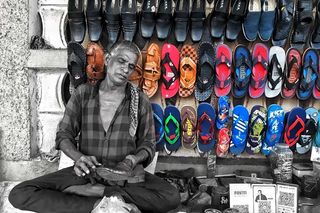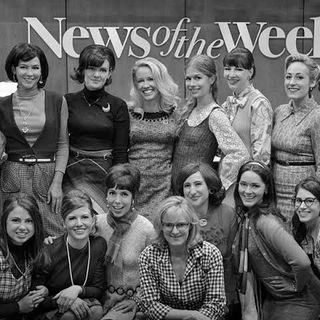
Peripheral Vision: a Cobbler
“I repair others’ shoes, but can’t afford to buy myself a pair.”

Our series, Peripheral Vision, explores the untold stories of people we encounter on a daily basis.
My name is Chandrakant Madhav Bhagat, and I’m 52. I’ve been a cobbler and been working out of the same place for 30 years. I sleep and live in my shop, on the footpath. The shop has been razed by the BMC so many times and destroyed by the rains, but I have nowhere else to go, so I keep rebuilding it.
I was born in a village in Maharashtra, and I went to school but dropped out soon because I was never interested in studies. Everyone in my family had been a cobbler — my father, my brother — and now I’m the only one left continuing this profession. I learned to repair and stitch shoes from them, just by observing.
My brother came to Mumbai in search of a job, and I tagged along. I worked with him, and we shared the same space, but a few years ago he passed away. Since then, I’ve rented out half of the shop’s space to someone else who is also a cobbler, and I work out of the other half.
I got married, but it didn’t work out between us. We separated, and I have no kids. So, I’m pretty much by myself in the city. From Monday to Saturday, I work nine to nine. On Sundays, I wrap up by six. Then I either visit my brother’s family, or some friends I’ve made over the years at the shop, or go to the beach. Sometimes, I also end up going to Kurla because that’s where I find all the raw material such as threads, gum, polishes for the business. Since I’ve been in the job for three decades, everyone knows me well enough, so sometimes even when I don’t have cash, they give me stuff on credit.
Related on The Swaddle:
Peripheral Vision: a Vegetable Vendor
People complain about how things are so far in the city and how they have to spend so many hours commuting for work, but look at me, I wake up in the same place I work at. The business has been slow. Nowadays, very few people consider getting their old, torn, or broken shoes repaired because replacing them is easier than making a round to the cobbler. I remember the olden times when people had just one pair or maybe two — one for regular use and another for special occasions — and how they used them until they got worn out. And it was in those days that people really needed us. Even now, most of my clientele include middle-aged to old people, not many youngsters. I think that’s the reason we have a very hand-to-mouth existence.
So, along with repairing material, every cobbler has had to stock up new shoes to sell, too. That is what gives us the money to survive, actually. We charge just Rs. 5 or Rs. 10 for fixing a broken shoe, and that is not enough to help me buy food or have enough money for when I fall sick or for other emergencies. And I can’t do anything else that is lucrative because I don’t have any other skills. I’ve thought of setting up a vada pav stall or selling tea, but it requires money and a place to store things. I don’t have either.
I have a few regular customers who give me food, blankets, and old clothes. One lady I know, who’s never even got anything done from me, had given me Rs. 500 when she saw that BMC had broken down the shop, just so I could set it up again. Another lady who takes this footpath to buy vegetables has made it a point to give me at least one food item or fruit every day. Sometimes, I go to the canteen nearby for lunch and dinner. There’s a chaiwala who gives me tea for free, and for water, I go to the temple or the mosque, which have waterpots for the poor. I get clothes, food, water, and even shoes as charity, because I can’t afford to buy myself a new pair. There have been instances when customers have gotten their shoes repaired and left them for me, and I’ve kept them if I needed them — but if I didn’t, then I handed them over to someone in need. People’s generosity has kept me alive until now, and I want to do the same for others in whatever capacity I can.
This interview has been condensed and edited for clarity. As told to Anubhuti Matta.
Anubhuti Matta is an associate editor with The Swaddle. When not at work, she's busy pursuing kathak, reading books on and by women in the Middle East or making dresses out of Indian prints.
Related


Women Dress Modestly to Avoid Policing … From Other Women, Says Study
